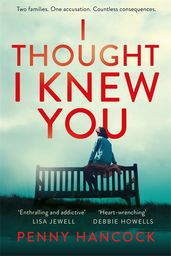Synopsis
For fans of He Said/She Said and Anatomy of a Scandal, Penny Hancock’s I Thought I Knew You is about secrets and lies – and whose side you take when it really matters.
Who do you know better? Your oldest friend? Or your child?
And who should you believe when one accuses the other of an abhorrent crime?
Jules and Holly have been best friends since university. They tell each other everything, trading revelations and confessions, and sharing both the big moments and the small details of their lives: Holly is the only person who knows about Jules’s affair; Jules was there for Holly when her husband died. And their two children – just four years apart – have grown up together.
So when Jules’s daughter Saffie makes a rape allegation against Holly’s son Saul, neither woman is prepared for the devastating impact this will have on their friendship or their families.
Especially as Holly, in spite of her principles, refuses to believe her son is guilty.
Details
Reviews
Enthralling and addictive with relationships so real I can't believe they're not still continuing somewhere . . . Utterly brilliant
A truly compelling story that captures exactly the complexity of friendship and motherhood and how everything we think we know can be challenged in one heartbreaking instant . . . Wonderful
Guaranteed to send chills down every mother’s spine, cutting to the heart of what it means to be a parent. It’s also an incredibly clever, nuanced analysis of female friendship and its limits . . . Beautiful, highly atmospheric prose and superb plotting
Emotionally compelling, I Thought I Knew You gets under the skin of the conflict between family and friendship, loyalty and suspicion when a terrible crime is committed. The portrayal of a lost teenage boy is heart-wrenching, while both sides of the story are painted with equal plausibility, leaving only instinct and unflinching maternal love

